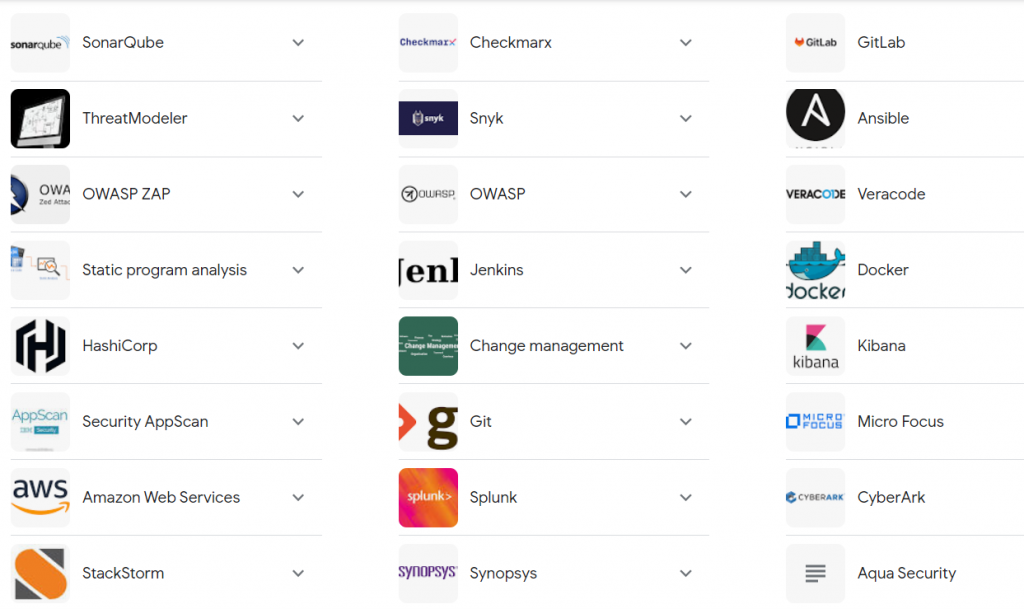Limited Time Offer!
For Less Than the Cost of a Starbucks Coffee, Access All DevOpsSchool Videos on YouTube Unlimitedly.
Master DevOps, SRE, DevSecOps Skills!

DevSecOps tools are used to integrate security into the software development lifecycle (SDLC). This can help to improve the security of software by finding and fixing vulnerabilities early in the development process.
DevSecOps tools can be used for a variety of tasks, including:
- Vulnerability scanning: This involves scanning code and applications for known vulnerabilities.
- Static application security testing (SAST): This involves analyzing code for potential security flaws.
- Interactive application security testing (IAST): This involves running tests on code during runtime to identify vulnerabilities.
- Dynamic application security testing (DAST): This involves sending simulated attacks to applications to identify vulnerabilities.
- Code review: This involves manually reviewing code for potential security flaws.
- Penetration testing: This involves simulating an attack on an application to identify vulnerabilities.
- Compliance checking: This involves verifying that applications meet specific security compliance requirements.
DevSecOps tools can help organizations to improve the security of their software by:
- Finding and fixing vulnerabilities early in the development process: This can help to prevent vulnerabilities from being introduced into production.
- Automating security checks: This can help to free up time for developers to focus on other tasks.
- Integrating security into the SDLC: This can help to ensure that security is considered throughout the development process.
- Improving collaboration between security and development teams: This can help to ensure that security is not an afterthought.
By using DevSecOps tools, organizations can improve the security of their software and reduce the risk of security breaches.
Here are some of the benefits of using DevSecOps tools:
- Improved security: DevSecOps tools can help to find and fix security vulnerabilities early in the development process, which can help to prevent security breaches.
- Reduced costs: DevSecOps tools can help to automate security checks and tasks, which can free up time for developers and other team members to focus on other work.
- Increased agility: DevSecOps tools can help to integrate security into the SDLC, which can help to speed up the development process.
- Improved compliance: DevSecOps tools can help organizations to comply with security regulations.
- Improved collaboration: DevSecOps tools can help to improve collaboration between security and development teams.
Static Application Security Testing (SAST):
- Checkmarx
- Veracode
- SonarQube
- Fortify
- WhiteSource
Dynamic Application Security Testing (DAST):
- OWASP ZAP
- Burp Suite
- AppSpider
- Acunetix
- Netsparker
Software Composition Analysis (SCA):
- Black Duck
- Snyk
- Nexus Lifecycle
- Whitesource Bolt
- Sonatype
Container Security:
- Aqua Security
- Twistlock (Now part of Palo Alto Networks)
- Sysdig
- Anchore
- Clair
Infrastructure as Code (IaC) Security:
- Terrascan
- Checkov
- Kics
- tfsec
- Bridgecrew
Vulnerability Management:
- Nessus
- OpenVAS
- Qualys
- Rapid7
- Nexpose
Security Orchestration, Automation, and Response (SOAR):
- Demisto (Now part of Palo Alto Networks)
- Phantom (Now part of Splunk)
- Siemplify (Now part of Splunk)
- Swimlane
- DFLabs
Cloud Security:
- AWS Security Hub
- Azure Security Center
- Google Cloud Security Command Center
- Dome9 (Now part of Check Point Software Technologies)
- CloudPassage
Identity and Access Management (IAM):
- Okta
- Auth0
- Ping Identity
- ForgeRock
- OneLogin
Security Information and Event Management (SIEM):
- Splunk
- Elastic Stack (ELK)
- QRadar (IBM)
- LogRhythm
- ArcSight (Micro Focus)
Code Analysis and Review:
- SonarQube
- CodeSonar
- Crucible (Atlassian)
- Review Board
- Phabricator
Secure Development Platforms:
- GitLab
- GitHub
- Bitbucket (Atlassian)
- GitLab
- JFrog
Secure Code Repositories:
- GitLab
- GitHub
- Bitbucket (Atlassian)
- GitLab
- JFrog
Secure Collaboration Platforms:
- Slack
- Microsoft Teams
- Mattermost
- Rocket.Chat
- Wire